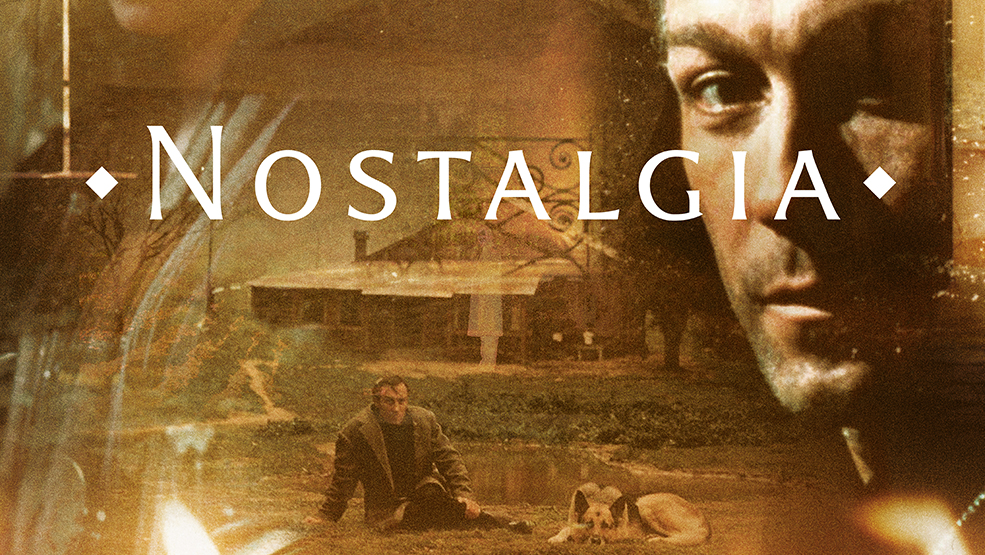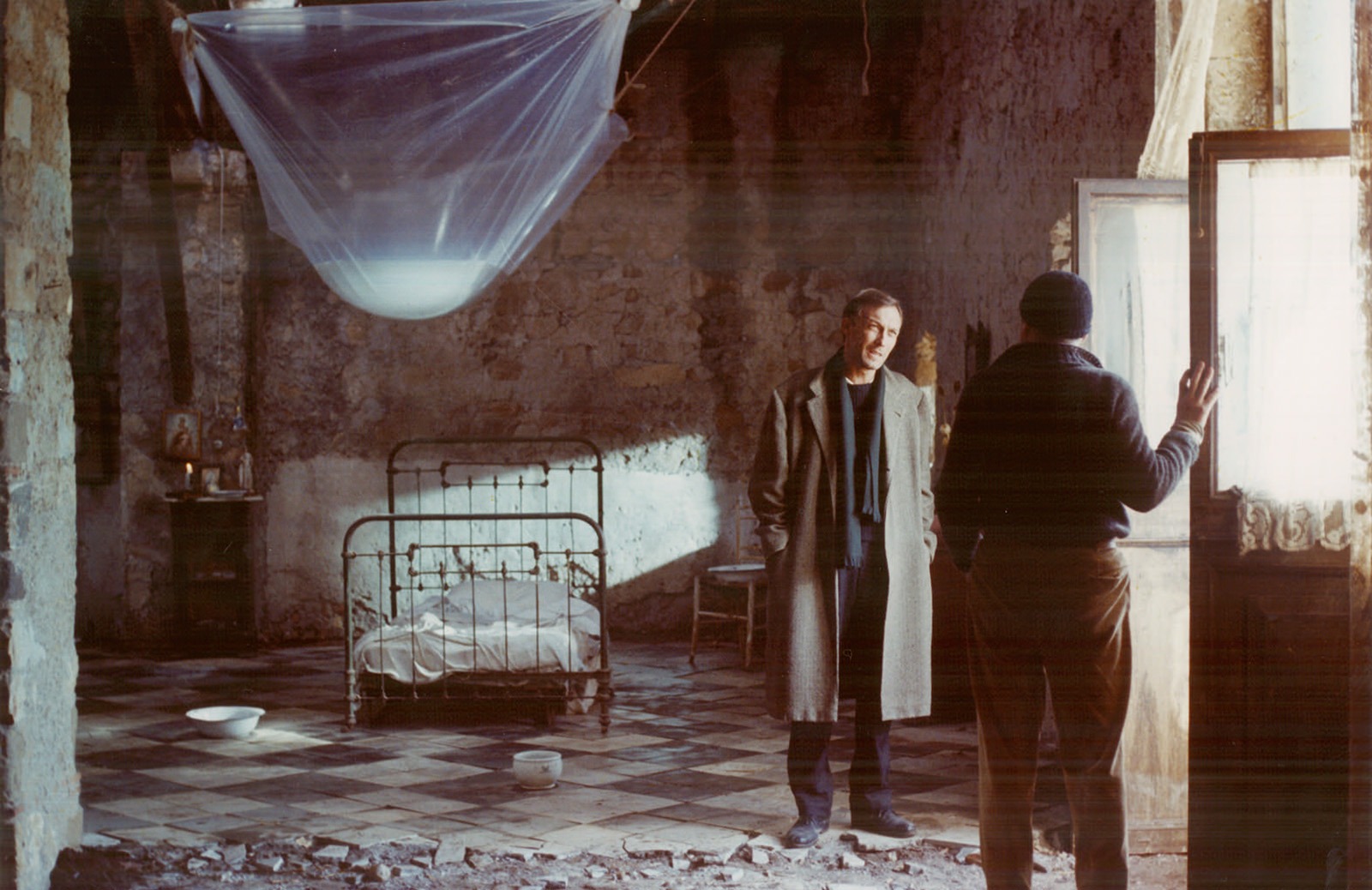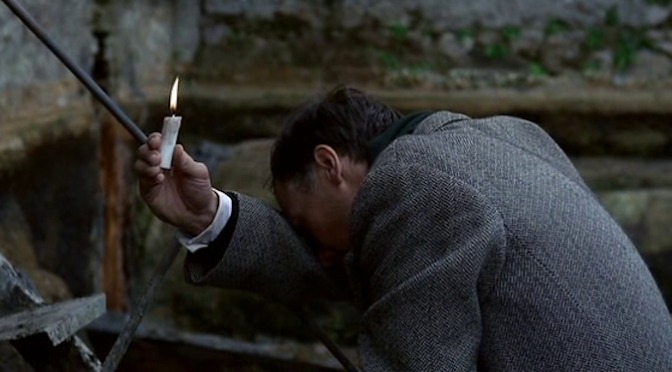Nostalgia (1983)

Nostalgia is a 1983 drama film directed by the legendary Russian filmmaker Andrei Tarkovsky. Known for his contemplative and philosophical style, Tarkovsky co-wrote the screenplay with Tonino Guerra. The film features a stellar cast, including Oleg Yankovsky, Domiziana Giordano, and Erland Josephson. Set in Italy, Nostalgia explores profound themes of memory, exile, and the yearning for a lost home. It stands as one of Tarkovsky’s most introspective and personal works, reflecting his own experiences of living outside of his native Soviet Union.
The plot of Nostalgia centers on Andrei Gorchakov (played by Oleg Yankovsky), a Russian writer who is living in Italy to research his book about an obscure Russian composer. As he navigates the unfamiliar surroundings of a foreign land, Andrei struggles with a deep sense of longing for his home in Russia. His journey is punctuated by encounters with other characters, including a mysterious woman named Gabriella (Domiziana Giordano) and a disillusioned guide (Erland Josephson), who help illuminate the emotional and spiritual desolation he faces. Through his interactions, Andrei becomes increasingly obsessed with the idea of home and the inexorable passage of time.
The film’s protagonist, Andrei Gorchakov, played by Oleg Yankovsky, is an introspective and complex character. His emotional turmoil and profound sense of alienation drive the narrative, and his search for meaning in a foreign land mirrors Tarkovsky’s exploration of displacement and loss. Gabriella, played by Domiziana Giordano, represents an enigmatic presence in Andrei’s life, offering both a potential connection and a reminder of his separation from his past. Erland Josephson’s character, a guide who shows Andrei around the Italian countryside, symbolizes the contrast between the beauty of the external world and the internal desolation that Andrei experiences. These characters are essential in shaping the themes of the film and Andrei’s emotional journey.
At the heart of Nostalgia is the theme of memory and the emotional weight it carries. The film explores how the past continues to haunt the present, particularly through Andrei’s constant yearning for his homeland and his inability to reconcile his present life with his past memories. The title Nostalgia itself speaks to this deep longing for a lost world that can never be fully recaptured. The use of symbolism throughout the film, such as water, mirrors, and the recurring image of fire, enhances this exploration of personal and collective memory. Tarkovsky’s slow, meditative cinematography further immerses the viewer in this emotional landscape.

Tarkovsky’s directorial style is renowned for its slow pacing, long takes, and meticulous attention to visual detail, all of which are evident in Nostalgia. The film’s contemplative pace allows for deep emotional resonance, as each scene is carefully constructed to reflect the inner turmoil of the characters. Tarkovsky uses natural landscapes, such as the Italian countryside and ancient ruins, as a canvas for exploring themes of time, decay, and existential yearning. The imagery is often symbolic, with vast empty spaces and lingering shots that evoke a sense of solitude and spiritual emptiness.

Another key element of Nostalgia is its exploration of spirituality. Tarkovsky often infused his films with religious and metaphysical themes, and Nostalgia is no exception. The film addresses the search for transcendence, with Andrei’s longing for home serving as a metaphor for a deeper spiritual yearning. Throughout the film, Andrei’s struggle to connect with his surroundings and with others reflects a quest for inner peace and understanding. The film suggests that this peace may be unattainable in the material world and that true fulfillment can only be found through reconciling with one’s past and accepting the inevitability of loss.

In conclusion, Nostalgia is a profound exploration of memory, loss, and the human condition, typical of Tarkovsky’s cinematic philosophy. Through the lens of a Russian expatriate struggling with the alienation of living abroad, the film delves into themes of exile, spiritual emptiness, and the painful yearning for a lost home. The poignant performances, coupled with Tarkovsky’s masterful direction and cinematography, make Nostalgia a deeply moving and introspective film. For audiences seeking a reflective and meditative cinematic experience, Nostalgia remains a timeless masterpiece of world cinema.











